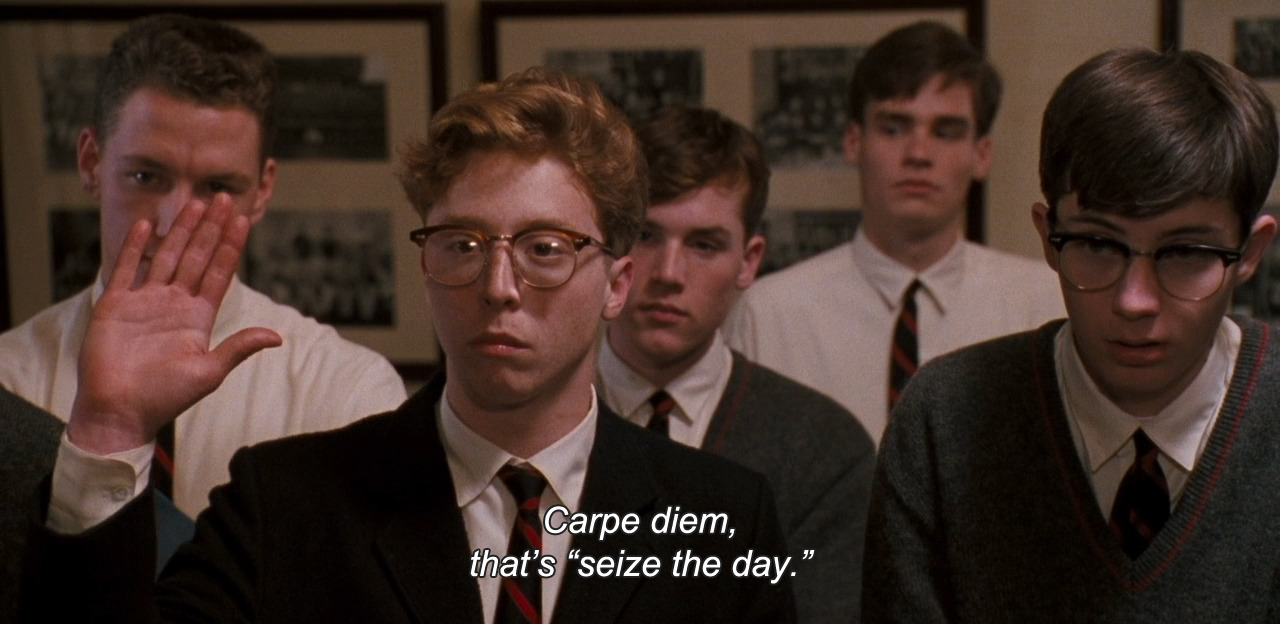

“Boys you must strive to find your own voice,” he memorably implores, “because the longer you wait to begin, the less likely you are to find it at all. “O captain, my captain,” the lads address Keating via Walt Whitman, and so did I, sitting in the front row of Keating’s classroom and ingesting whole his lesson of the human spirit as something unquenchable and the human soul as something to be protected from too much outside stimuli and influence. It dovetailed with the same anti-establishment barbaric yawps of punk and college rock I cut my teeth on in the ’80s, and, during the Reagan years, it spoke to me about what sensitive artists are up against in a world of competition and commerce. I got the message the year I graduated college and set off to be a writer. Listen, you hear it? ‘Carpe’… hear it? ‘Carpe, carpe diem,’ seize the day boys, make your lives extraordinary.” But if you listen real close, you can hear them whisper their legacy to you. Did they wait until it was too late to make from their lives even one iota of what they were capable? Because, you see gentlemen, these boys are now fertilizing daffodils.
Carpe diem dead poets society full#
Their eyes are full of hope, just like you. They believe they’re destined for great things, just like many of you.

“They’re not that different from you, are they?” says Mr.

Pointing to yellowing photos of former students, he implores the young bucks to reject conformity and to think for themselves. It happens in the very first scene we see Keating/Williams, as he stands in front of a trophy case with his class of impressionable but already buttoned-downed future barons of industry at the dawn of the ’60s.
Carpe diem dead poets society movie#
To be sure, if there’s any good to come from William’s shocking passing, it’s the fact that by Monday night, Thoreau quotes were flying around the Internet like so many selfies, and millions of movie goers came to realize it was Williams/Keating who taught us the meaning of “carpe diem,” the Latin phrase for “seize the day.” I can’t say for sure that “Dead Poet’s Society” was my introduction to Thoreau, but I know for sure it captured a romance with writing, reading, and the natural world that lives and breathes in me to this day. Keating via Williams, who taught me and so many others so much with just a few words. I’ve seen it a couple times since, the last time being Monday night, during my own private memorial for Mr. I saw it the year it came out, in 1989, in Minneapolis, and that summer I took a group of international students to see and love it while I was an intern at the Florida Times-Union in Jacksonville, Fla. “Dead Poet’s Society” is my favorite Williams moment, the only one that really took root in me. Keating closes the book and puts his head in his hand and sobs - which is how much of the world reacted upon hearing the news that Williams, 63, had taken his own life. To put to rout all that was not life and not, when I had come to die, discover that I had not lived.Īt that, Mr. I wanted to live deep and suck out all the marrow of life. I went to the woods because I wanted to live deliberately. He sits alone in his study, the weight of one of his star pupil’s suicide etched on his face, and reads the quote from Henry David Thoreau’s “Walden Pond” that Keating himself scribbled on the first page of the book as an idealistic young student in 1942, along with the instructions that it be read at the outset of every meeting of the dead poet’s society: At the end of “Dead Poet’s Society,” Robin Williams, playing the part of inspirational poetry teacher John Keating, opens a well-worn book of poems.


 0 kommentar(er)
0 kommentar(er)
